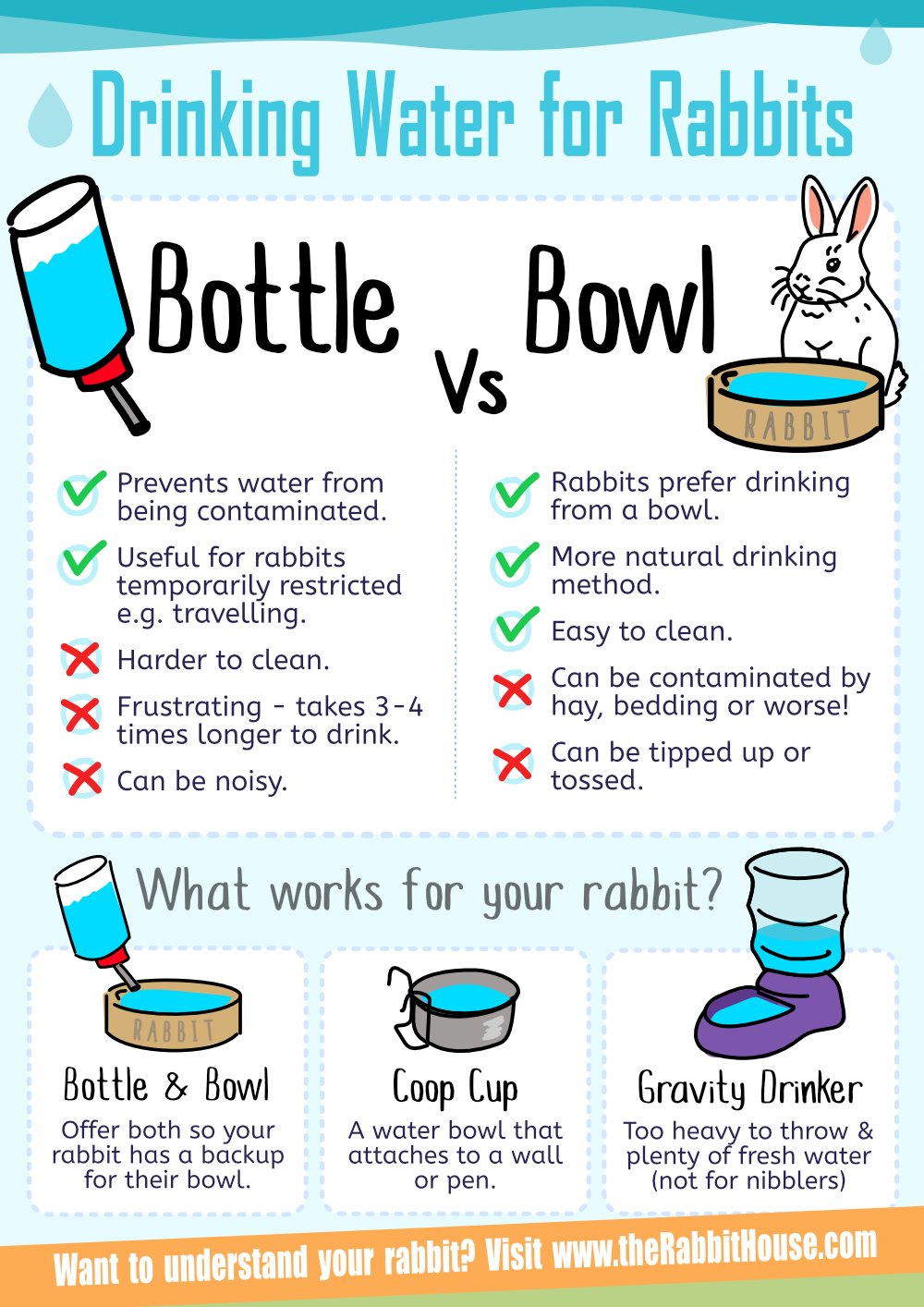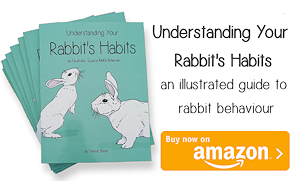Water for your Rabbit
The most important things you need to know about providing water for your rabbit is that it should always be available and your rabbit will prefer to drink it from a bowl. Don't stop here though, read on, I think it helps to understand a bit more about the role that water plays in your rabbit's health, diet and behaviour so you can better meet their needs.
- Why water is important to rabbit's health
- How much should rabbits drink?
- How does diet (e.g. fresh greens) impact water intake?
- Do rabbits still need water if they have fresh food?
- Can rabbits drink tap water, or should I use filtered/bottled water?
- Should I add supplements to my rabbits' water?
- Bottle or Bowl?
- How often should I change my rabbit's water?
Why water is important to rabbit's health
We all know that water is essential to all animals, but good hydration is particularly important to rabbit's because of how their digestive system works.
Water plays a vital role in rabbit digestion, as it helps food move through the gastrointestinal tract and reduces the risk of gastrointestinal (GI) stasis, where the digestive system slows down or stops. The rabbit digestive system developed to work with grass which has a high moisture content, where as many pet rabbits eat a lot of hay and dry foods which have low moisture content, so they need to supplement with drinking more water. Proper hydration keeps food soft as it moves the gut and allows the intestines to function properly. Dehydration can slow the digestive process, leading to stasis and blockages. One study indicated that when water isn't consistently available rabbits may try and compensate by reducing the amount they eat, which again increases risk of stasis.
The way rabbit's process calcium also relies on good hydration. Whereas most animals only absorb the amount of calcium their body needs from their food and leave the rest to excreted with their poop, rabbits absorb almost all the calcium they ingest and then excrete what is not needed through their urinary system. This means that their urine can have high levels of calcium in it and if it's not diluted with plenty of water it increases the risk of bladder sludge or bladder stones. Some rabbits are particularly prone to issues around excess calcium and keeping them well hydrated is a key part of managing their symptoms.
How much should rabbits drink?
Rabbits tend to drink a little and often when water is freely available, one study found rabbits visited their water bowls 15 times per day! This is probably because rabbits spend a lot of time grazing so top up on water as they top up on food – lots of times through the day.
It's difficult to give a very precise amount that a specific rabbit should drink. On average, rabbits will drink 50-150 mL of water per kilogram of body weight daily. For example, a medium size (2 kg) rabbit would consume anywhere from 100 to 300 mL of water each day. That's a very broad range as the amount a rabbit drinks varies depending on their diet (that's a biggest influence) and environment. Rabbits drink less when they have fresh foods with high water content to eat and more when fed a mainly dry food based diet, in hot weather, or when they are feeding babies.
Don't worry too much about the specific amount your rabbit is drinking day to day compared to other's rabbits', as long as they are healthy and have free access to water they will generally control their own intake appropriately.
What should keep an eye out for is unexplained fluctuations in the amount they drink, as a sudden increase or reduction can be a symptom of health issues like stasis or a urinary tract infection. If your rabbit suddenly stops drinking water you should consult your vet. If you use a bottle or other device to dispense water ensure it is working correctly and offer your rabbit a bowl to drink from.
How does diet (e.g. fresh greens) impact water intake?
Rabbits fed fresh foods or allowed to graze on grass will obtain much of their water requirement from this and may drink up 50% less than rabbits only fed on dry foods, even though their overall water intake remains the same or higher because of the water content of the food.
Although fresh vegetables are an excellent source of water and other nutrients, it's important that rabbits have a predominantly grass-based diet – which for most pet rabbits means lots of hay. I'd certainly encourage offering some fresh grass alongside hay if you can as it has all the high fibre benefits of hay along with the high water content. Keep in mind if you increase the greens/fresh grass in your rabbit's diet don't panic if you find they drink less water from a bottle/bowl, as they are getting extra water from their food and that's perfectly fine.
Do rabbits still need water if they have fresh food?
You might wonder if rabbits need water provided separately at all if they are eating a diet with a high water content like grass and fresh forage. Although on paper it may be technically possible for a rabbit to get all the necessary water from food there are lots of circumstances when their water intake from food may not match their water needs. For example, in hot weather, if they become unwell and eat less food or at dry foods or treats that have a low water content. Dehydration is not worth risking - rabbits should always have unrestricted fresh water available.
Can rabbits drink tap water, or should I use filtered/bottled water?
If your tap water is safe for human consumption, it is generally safe for rabbits. However, if you're concerned about contaminants or use filtered/bottled water for your own drinking water you should use the same water for your rabbits.
Another situation where you might consider alternatives to tap water is if your area has particularly hard water and your rabbit has issues relating to their urinary tract. Your water company may tell you if you have hard water (in the UK it will say on your water companies website). You'll probably also notice lime scale built up on your taps or other areas water is in use. You may even notice a white residue around the edge of your rabbits' water bowl where water evaporates and leaves calcium behind. Hard water isn't a problem for most rabbits, however if your rabbit has urinary tract issues and your vet has recommended a low calcium diet, you may want to consider using bottled water instead to eliminate the additional calcium from hard drinking water.
Should I add supplements to my rabbits' water?
In almost all cases rabbits should be given pure water to drink. This may seem boring to humans used to a wide range of beverages, but it is the most natural and healthy option.
Adding things to water – I've heard of fruit juice, apple cider vinegar and liquid vitamins – can flavour the water and may encourage your rabbit to drink excessively. As with treats and dry food – rabbits will consume high calorie/sugar things if they are available without any consideration for their gut health, teeth health or waistline. They are also completely unnecessary if your rabbit eats a healthy diet.
If you do decide to go ahead with adding a supplement and find your rabbit empties its bowl/bottle, then refill with plain water. Excess water and excess vitamins can affect your rabbits' health.
The only exception to this rule is for unwell rabbits at risk of dehydration when you are trying to increase water intake with the support of your vet - a small amount of pure unsweetened apple or carrot juice added to the water may encourage drinking.
Bottle or Bowl?
Bottle verses bowl has long been debated. Rabbits prefer bowls – and I'm not just saying that, scientific studies have found the same thing – when they gave rabbits the choice they all consistently drunk from a bowl over a bottle, even though they'd been used to using a bottle before.
Bowls allow rabbits to drink in a more natural position and they also allow them to drink more freely. The same study compared the time spend and it took rabbits 3-4 times longer to get the same amount of water from a bottle as a bowl.
So why is it a debate? Bottles tend to keep water cleaner as rabbits have a habit of throwing and kicking things around that then potentially end up in the bowl… or even throw the bowl itself. The issues aren't unresolvable, but it means a little more thought may need to go into providing water in a bowl if you've got mischievous bunnies. I have more detailed advice on picking a water container here.

I've written a whole separate article on choosing water bottles/bowls for your rabbits and how to deal with those that like to throw them or foul them.
How often should I change my rabbit's water?
Fresh water should be provided daily, and the water container (whether a bowl or bottle) should be cleaned regularly to prevent bacterial growth. Even if the water looks clean, bacteria can build up quickly. Bowls may need more frequent changes, especially if your rabbit tends to get hay, food, or worse in the water. Having a duplicate bowl so you can pop one through the dishwasher or give it a good soak/scrub can make things easier – see this article on water bottle/bowls for advice on choosing drinking vessels.
References
Tschudin A, Clauss M, Codron D, Hatt JM. Preference of rabbits for drinking from open dishes versus nipple drinkers. Vet Rec. 2011 Feb 19;168(7):190. doi: 10.1136/vr.c6150. Epub 2011 Feb 11. PMID: 21493534.
Harcourt-Brown F. Importance of water intake in rabbits. Vet Rec. 2011 Feb 19;168(7):185-6. doi: 10.1136/vr.d964. PMID: 21493529.
Tschudin A. Study on water and feed intake in dwarf rabbits under various practical feeding and drinking regimes. 2010. Department of Small Animals, Clinic for Zoo, Domestic and Wild Animals of the Vetsuisse Faculty, University of Zurich















